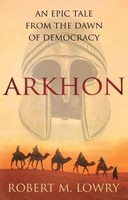Author's Note
Most of the characters appearing in the novel Arkhon are based on real people and their relationships. These characters, events and much of the political discourse are mainly sourced from Herodotus (The Histories, trans. by Aubrey de Selincourt, Penguin Books, 1996). Many quotations and references are derived from the works of Homer: The Odyssey (trans. by E.V. Rieu & D.C.H. Rieu, Penguin Books, 1946/1991); The Odyssey (trans. by S.H.Butcher & A.Lang, Macmillan and Co., 1913); and The Iliad (trans. by Martin Hammond, Penguin Books, 1987); and The Iliad (trans. by Samuel Butler, 1898). The Orphic poetry is based on The Hymns of Orpheus (trans. by Thomas Taylor, 1792). Other key sources include Thucydides (History of the Peloponnesian War, trans. by Rex Warner, Penguin Books, 1954), Plutarch (On Sparta, trans. by Richard J.A. Talbert, Penguin Books, 1988; and The Rise and Fall of Athens trans. Ian Scott-Kilvert, Penguin Books, 1960), and Aristotle (The Politics and The Athenian Constitution, trans. by John Warrington Heron Books, n.d) Some of the speeches come from a compilation of translations from various news outlets of speeches made in 2011 by Egyptian President Hosni Mubarak and Libyan leader Muammar Gaddafi. Other comments and crowd chants are derived from political leaders and demonstrators from around the world – primarily during 2011-13. The New Year’s Address to the Nation given by Vaclav Havel in Prague 1990 (http://old.hrad.cz/president/Havel/speeches/index_uk.html) is also quoted in parts. The novel also includes quotations from the Putney Debates of 1647 and the discussions leading up to the Great Reform Act of 1832; these are taken from Parliamentary Reform 1640-1832 by John Cannon (Cambridge University Press, 1973). Arkhon includes words from the 1863 Gettysburg Address by US President Abraham Lincoln, and words from the speech given by Paul to the Council of the Areopagos (Acts 17:22). Moreover, Arkhon alludes to the ancient works of Aesop, as well as Hesiod, Anacreon, Chilon, Solon, Pittacus, Cleobulus and Bias.
Please accept my apologies for any omissions.
RML
September 2013


